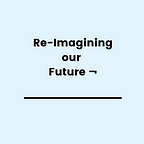Re-Imagining Democracy
Across the globe, there seems to be a growing dissatisfaction with our political systems. Regardless of recent election results, we cannot deny many people seem to be wondering whether our democracy is capable of providing us with the leadership we need to transform the status quo. This has led to polarization, ‘alternative’ facts, ‘extreme’ views, identity politics and other expressions of frustration and anger. So, how can we better engender a world where people, at all levels, listen to each other and feel listened to?
I cannot offer you a magic bullet, but I think it would be interesting to look for some answers in our education system. How can we expect people to hold space for each other and accept that reality is nuanced and multi-shaded, when our education systems seem to be based on the exact opposite? The forms of mass education that took over the world in the past 200 years, still largely uphold teachers and curricula as authorities and students as subordinate. In the classroom, the students’ main job is to be quiet and listen (more often than not) where they can only speak when given permission. Collaboration is often called ‘cheating’. There is usually only one right answer, and that is the one in the textbook (which is sometimes outdated and/or one-sided).
Children have limited freedom to design their education in a way that best fits their needs and their curiosity about the wide and diverse world we live in.
So often, when things go wrong in society, people look at education to offer solutions. What if we flip the script, and reflect on where education might be leading to some of the problems we are facing now?
Instead of creating ‘monocultures of the mind’ that try to drill students into obedience, let us create diverse and pluralistic ecosystems of learning. You reap what you sow. If you want to create a world where people find common ground despite their differences, and where people feel their voices matter, we should start doing so at a young age. Have you seen this before? What do you think that would look like?
In the words of Thich Nhat Hanh;
Your mind is like a piece of land planted with many different kinds of seeds: seeds of joy, peace, mindfulness, understanding, and love; seeds of craving, anger, fear, hate, and forgetfulness. These wholesome and unwholesome seeds are always there, sleeping in the soil of your mind. …
If you plant tomato seeds in your gardens, tomatoes will grow. Just so, if you water a seed of peace in your mind, peace will grow. When the seeds of happiness in you are watered, you will become happy. When the seed of anger in you is watered, you will become angry. The seeds that are watered frequently are those that will grow strong. (quote from Thich Nhat Hanh & Nguyen Anh-Huong, Walking Meditation)
What seeds are we planting? Watching the first debate in the US election made me question this? Two people ‘fighting’ to become the president of the United States not even able to have a proper conversation. Not even able to listen to the other speaker. Blaming. Calling names. Nitpicking. What do you think young children that were watching the debate were thinking?
This journey of transformation must be one of deep compassion. Ram Dass talked of having pictures of corrupt politicians on his prayer altar alongside saints and other spiritual teachers. The presidential candidates, just like the wonderful people working within the flawed systems of education, are symptoms of larger problems. They, as individuals, are perfect, and should be received with complete Love.
But, we still must reflect, what seeds are we planting? Anthony Cajete, the Indigenous Educationalists, in his book Look to the Mountain, describes the Native American children being forced into the competitive games that the ‘American’ kids were playing during the time when settlers were trying to ‘Americanize’ the people that they took the land from. Cajete describes that it was hard for these Native American kids to adapt as they previously were only used to non-competitive games.
This rather overt example can open the door to more subtle questions: Why are our schools inherently competitive, hierarchical, one-size-fits-all? Why do kids oftentimes grow up learning that it is more important to listen to someone else, than to listen to themselves? Perhaps this relationship is the same as constituents, and their elected officials? What is regenerative power and leadership? What is genuine democracy? Are the institutions that we are calling democratic, truly democratic? Should they be? If not, what then?
Lead Author: Jazz (Gijs) Van den Broeck (first 4 paragraphs)
Jazz (Gijs) Van den Broeck is a seeker who has lived the past 3 years in Sadhana Forest, an unschooling eco-community in Auroville, India. He loves to reflect, teach and write about the variety of ways in which we can transform ourselves and our communities in order to become more inclusive, sustainable and wholesome. You can follow him on his blog or Instagram.
If you want to get an idea, you can look up unschooling, self-directed education, democratic schools or free schools to get started.
Anchor Author: Daniel Rudolph
Daniel Rudolph is interested in exploring alternative, experiential learning opportunities for people of all ages. He is passionate about forming community, and building public spaces for meaningful, transformational gathering. Currently he is spending a lot of his time learning juggling and facilitating gatherings. He also enjoys writing and sharing poetry. Daniel is a very curious and playful person and is always open for creative collaborations.
